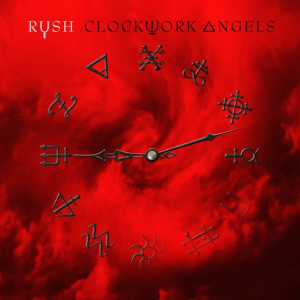"Caravan" is reintroduced in a refurbished form and sets a rich tone at the outset. The mix on Clockwork Angels is immediately fantastic. Geddy Lee's bass is more prominent than I have ever heard and, vocally, he is in fine form. For this listener his unique vocals have improved as time has shifted them, nimble as they are, into a slightly lower register. Rush have always balanced in some magic middle ground between prog and hard rock and they tilt unabashedly into dense progressive territory here, all textures and technicality trotted out to build a massive framework for a big, heavy, powerful record. An updated "BU2B" follows and these two tracks effectively introduce the wide-eyed, dreaming narrator and fascist Watchmaker and insert the seeds of doubt into this overly ordered utopia. Both remain extremely effective tracks well-deserving of what is obviously already a presence in the band's live canon.
Title track "Clockwork Angels" weaves a gossamer prog fabric across seven and a half minutes but never quite gels into anything particularly memorable while "The Anarchist" savages suitably, with Geddy's bass jabbing menacingly and Alex Lifeson delivering some absolutely searing guitar at the five-minute mark. The men with the strings are so fiery here - and continue, even toward prog metal, with "Carnies" - that one realizes how easy it is to take Neil Peart for granted at this point. Five tracks in, I had to start over and intentionally focus on the percussion to assess. Admittedly, there's nothing new under the sun here but it is an understatement to say that Peart delivers his usual wares. It's faux-cerebral and overused but there really is an organic feel to his drumming at this point in the band's career. It's as though the man knows exactly, naturally where to move in space and someone just happened to place the drumkit where it needed to be to catch all the key intersections. Just wonder, if you will, at the instrumental interplay beginning around the 2:40 mark on the aforementioned "Carnies."
At this point in the storyline (also authored by Peart), our hero has traveled to Crown City, witnessed the Clockwork Angels at the Cathedral of the Timekeepers, found work in a traveling carnival and has run across an anarchist seeking vengeance who sets him up as scapegoat in a bombing plot. You know, the usual rock song fare...
"Halo Effect" is a brief song dealing with love gone wrong and feels forced and almost cloying. "Seven Cities of Gold" is itself the gem on Clockwork Angels. A massive riff-monster, this is an instant classic and, while worked into the narrative as a fool's paradise on our hero's travels, it really hearkens back to tracks like "Territories" or "Xanadu" for this listener. This is big, bombastic rock tied directly to the band's proto-Zeppelin roots and is home to one of the finest solos Lifeson has laid down in a long, long time.
"The Wreckers," luring the narrator's ship aground with the worst of intentions, is as standard modern-era Rush as one gets on Clockwork Angels. It's a good, sing-along-able track that will likely translate well live but, frankly, bookended by "Seven Cities of Gold" and "Headlong Flight," it's quickly forgotten. "Headlong Flight" is another epic entry in an album already blessed and will vie with "Seven Cities of Gold" as the fans' favorite. For the Peart percussive faithful, this is his moment in the spotlight. A Gilmour Floyd-esque proclamation of life unbound and free of abandon, "Headlong Flight" is propelled aloft by some of the most imaginative, mind-blowing work I've heard from Peart in years.
"BU2B2" feels like a blip in its 90 seconds and serves to define the story arc, the protagonist's belief broken and resolve remains to "find a measure of love and laughter and another measure to give." Much like "The Wreckers," "Wish Them Well" is a slab of trademark Rush retro-nouveau-pop (steampop?) with a live-and-let-live message.
"The Garden" closes the narrative in a mature, satisfying fashion. The Clockmaker is not thwarted, life continues to tick away and one determines to do all they can just to live their life according to their values and tend their own garden. Sonically, it's an overlong and overly convoluted ballad and a bit too low-key given the power of the rest of the record but I must admit that, lyrically, it's as good as it gets for Rush, a band never labeled slouches in the arena of words.
Clockwork Angels feels like the final, near-perfect refinement of the muscle the band have been honing since the renaissance they started with Counterparts. As a cohesive statement, I personally find Clockwork Angels to be the finest, most satisfying work the band has turned in in 30 years, rivaling 1982's Signals. It's a work that manages to come across as mature and masterful without ever feeling safe or stale. There's no reason a neophyte fan could not wander into a record store and kick off a respectable Rush collection with Clockwork Angels, a record that communicates a healthy strand of rock-and-roll DNA nearly forty years long while still managing to craft classic songs kids will be playing in, who knows, 2112?


Excellent review. I just picked the record up today after completely mind-blanking its existence. The title track is forgettable and skippable at that.
ReplyDeleteI'm not sure what my favorite song is yet, but my first listen told me that the album is much, much better than Snakes & Arrows.
I definitely agree. This is the record I wanted Snakes & Arrows to be. The rock moments are frequent, big, muscular and memorable. I have a ticket to see these guys in September and have at least a half-dozen new "favorites" I'm praying make the setlist. Thanks for reading!
Delete